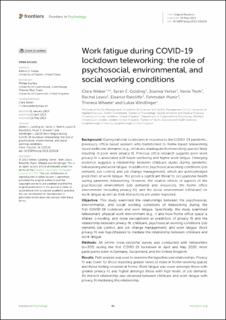Please use this identifier to cite or link to this item:
https://doi.org/10.21256/zhaw-27800| Publication type: | Article in scientific journal |
| Type of review: | Peer review (publication) |
| Title: | Work fatigue during COVID-19 lockdown teleworking : the role of psychosocial, environmental, and social working conditions |
| Authors: | Weber, Clara Golding, Sarah E. Yarker, Joanna Teoh, Kevin Lewis, Rachel Ratcliffe, Eleanor Munir, Fehmidah Wheele, Theresa Windlinger Inversini, Lukas |
| et. al: | No |
| DOI: | 10.3389/fpsyg.2023.1155118 10.21256/zhaw-27800 |
| Published in: | Frontiers in Psychology |
| Volume(Issue): | 14 |
| Issue: | 1155118 |
| Issue Date: | 2023 |
| Publisher / Ed. Institution: | Frontiers Research Foundation |
| Language: | English |
| Subjects: | COVID-19; Home office; Teleworking; Privacy; Psychoscial working condition; Lockdown; Burnout |
| Subject (DDC): | 158: Applied psychology 331: Labor economics |
| Abstract: | Background: During national lockdowns in response to the COVID-19 pandemic, previously office-based workers who transitioned to home-based teleworking faced additional demands (e.g., childcare, inadequate homeworking spaces) likely resulting in poor work privacy fit. Previous office research suggests poor work privacy fit is associated with lower wellbeing and higher work fatigue. Emerging evidence suggests a relationship between childcare duties during pandemic teleworking and work fatigue. In addition to psychosocial working conditions (job demand, job control, and job change management), which are acknowledged predictors of work fatigue, this poses a significant threat to occupational health during pandemic teleworking. However, the relative effects of aspects of the psychosocial environment (job demands and resources), the home office environment (including privacy fit), and the social environment (childcare) on work fatigue as well as their interactions are under-explored. Objective: This study explored the relationships between the psychosocial, environmental, and social working conditions of teleworking during the first COVID-19 lockdown and work fatigue. Specifically, the study explored teleworkers’ physical work environment (e.g., if and how home office space is shared, crowding, and noise perceptions) as predictors of privacy fit and the relationship between privacy fit, childcare, psychosocial working conditions (job demand, job control, and job change management), and work fatigue. Work privacy fit was hypothesized to mediate the relationship between childcare and work fatigue. Methods: An online cross-sectional survey was conducted with teleworkers (n = 300) during the first COVID-19 lockdown in April and May 2020; most participants were in Germany, Switzerland, and the United Kingdom. Results: Path analysis was used to explore the hypothesized relationships. Privacy fit was lower for those reporting greater levels of noise in home-working spaces and those feeling crowded at home. Work fatigue was lower amongst those with greater privacy fit and higher amongst those with high levels of job demand. An indirect relationship was observed between childcare and work fatigue with privacy fit having a positive mediation effect. Conclusions: The influence of privacy fit has so far been largely neglected in research on teleworking, especially during the pandemic. However, its contribution to workers’ wellbeing should be acknowledged in occupational health strategies. |
| URI: | https://digitalcollection.zhaw.ch/handle/11475/27800 |
| Fulltext version: | Published version |
| License (according to publishing contract): | CC BY 4.0: Attribution 4.0 International |
| Departement: | Life Sciences and Facility Management |
| Organisational Unit: | Institute of Facility Management (IFM) |
| Published as part of the ZHAW project: | Homeworking during COVID-19 lockdown: Relationships between physical and social environments at home, work fatigue, musculoskeletal pain, and future teleworking inclinations |
| Appears in collections: | Publikationen Life Sciences und Facility Management |
Files in This Item:
| File | Description | Size | Format | |
|---|---|---|---|---|
| 2023_Weber-etal_Work-fatigue-during-Covid-19-lockdown-teleworking_fpsyg.pdf | 949.97 kB | Adobe PDF |  View/Open |
Show full item record
Weber, C., Golding, S. E., Yarker, J., Teoh, K., Lewis, R., Ratcliffe, E., Munir, F., Wheele, T., & Windlinger Inversini, L. (2023). Work fatigue during COVID-19 lockdown teleworking : the role of psychosocial, environmental, and social working conditions. Frontiers in Psychology, 14(1155118). https://doi.org/10.3389/fpsyg.2023.1155118
Weber, C. et al. (2023) ‘Work fatigue during COVID-19 lockdown teleworking : the role of psychosocial, environmental, and social working conditions’, Frontiers in Psychology, 14(1155118). Available at: https://doi.org/10.3389/fpsyg.2023.1155118.
C. Weber et al., “Work fatigue during COVID-19 lockdown teleworking : the role of psychosocial, environmental, and social working conditions,” Frontiers in Psychology, vol. 14, no. 1155118, 2023, doi: 10.3389/fpsyg.2023.1155118.
WEBER, Clara, Sarah E. GOLDING, Joanna YARKER, Kevin TEOH, Rachel LEWIS, Eleanor RATCLIFFE, Fehmidah MUNIR, Theresa WHEELE und Lukas WINDLINGER INVERSINI, 2023. Work fatigue during COVID-19 lockdown teleworking : the role of psychosocial, environmental, and social working conditions. Frontiers in Psychology. 2023. Bd. 14, Nr. 1155118. DOI 10.3389/fpsyg.2023.1155118
Weber, Clara, Sarah E. Golding, Joanna Yarker, Kevin Teoh, Rachel Lewis, Eleanor Ratcliffe, Fehmidah Munir, Theresa Wheele, and Lukas Windlinger Inversini. 2023. “Work Fatigue during COVID-19 Lockdown Teleworking : The Role of Psychosocial, Environmental, and Social Working Conditions.” Frontiers in Psychology 14 (1155118). https://doi.org/10.3389/fpsyg.2023.1155118.
Weber, Clara, et al. “Work Fatigue during COVID-19 Lockdown Teleworking : The Role of Psychosocial, Environmental, and Social Working Conditions.” Frontiers in Psychology, vol. 14, no. 1155118, 2023, https://doi.org/10.3389/fpsyg.2023.1155118.
Items in DSpace are protected by copyright, with all rights reserved, unless otherwise indicated.